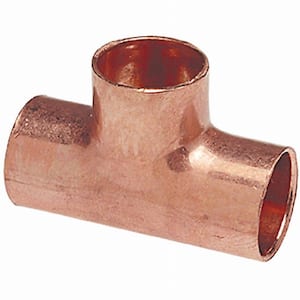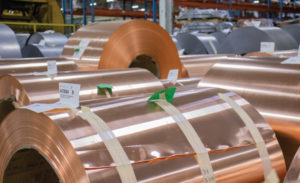Discovering the Convenience and Longevity of Cutting-edge Copper Products in Modern Style
How Copper Products Add To Sustainable Practices in Various Sectors
Copper items are progressively acknowledged for their significant contributions to lasting practices across numerous industries, driven by their fundamental residential or commercial properties such as sturdiness, effectiveness, and recyclability. In eco-friendly energy systems, for instance, copper boosts the capability of solar and wind technologies, while its application in building and construction minimizes waste via durability. The product's antimicrobial qualities offer appealing benefits in healthcare setups. As sectors look for to take on even more sustainable techniques, the function of copper can prove crucial in accomplishing ecological objectives. What ramifications might this have for future advancements in sustainability?
Copper in Renewable Resource
Copper plays a crucial duty in the development of renewable energy innovations, functioning as an important conductor in different applications. Its exceptional electrical conductivity and resistance to corrosion make it an optimal product for electric circuitry, which is vital in photovoltaic panels, wind turbines, and power storage systems. In solar photovoltaic systems, copper is made use of in the affiliations and circuitry, allowing effective energy conversion from sunshine to electrical energy.
In wind energy, copper is essential to the generators and transformers that convert kinetic power into electrical energy, making certain optimal efficiency and reliability. Additionally, the demand for electrical lorries (EVs) is enhancing, with copper being a vital component in batteries, motors, and charging framework. The change to EVs considerably boosts the need for copper, as these vehicles usually use 4 times extra copper than traditional inner combustion engine lorries.
As the globe looks for to reduce climate change and change to lasting power sources, copper's role comes to be progressively critical. The product not only enhances the effectiveness and sturdiness of renewable resource systems but also sustains the broader objective of decreasing greenhouse gas emissions and promoting a lasting future.
Eco-Friendly Construction Materials
In the last few years, there has been a remarkable change in the direction of the adoption of environmentally friendly building products in feedback to growing environmental worries. This adjustment is encouraged by the demand for lasting choices that reduce environmental footprints while maintaining structural integrity and visual allure.
Copper, recognized for its durability and recyclability, has become a principal in this market. It can be used in roofing, pipes, and electrical systems, adding to energy efficiency and decreasing waste. Copper's durability implies less replacements over time, further boosting its sustainability account.
Additionally, products such as bamboo, recovered timber, and reused steel are obtaining appeal. These options not only use reduced ecological influence however likewise promote resource conservation. As developing codes increasingly highlight sustainability, designers and building contractors are integrating these materials right into their jobs, promoting technology in design.
The raising adoption of eco-friendly building products shows a wider dedication to sustainability in the constructed environment. By focusing on these materials, the building and construction sector can dramatically minimize its carbon impact, straighten with regulative criteria, and sustain a much healthier ecosystem for future generations. This trend marks a crucial action in the direction of a much more sustainable future in building.
Copper's Role in Health care
Current studies have highlighted the substantial function of copper in medical care settings, particularly due to its antimicrobial properties. Copper surfaces have actually been revealed to lower the existence of pathogens, including viruses and microorganisms, by up to 99.9% within a brief duration. This impressive efficacy makes copper an important material for high-touch surfaces in health centers, such as doorknobs, bed rails, and IV posts, thereby adding to enhanced infection control actions.
In enhancement to its direct antimicrobial results, copper additionally plays a duty in the wider context of hospital sustainability (Copper Products). By including copper right into medical devices and furnishings, medical care facilities can minimize the occurrence of healthcare-associated infections (HAIs), which not just boosts client results however additionally lowers the expenses connected with prolonged medical facility remains and additional therapies
Moreover, copper's longevity and recyclability line up with sustainable techniques, permitting accountable source administration. As healthcare systems progressively prioritize both patient security and environmental stewardship, the integration of copper items is coming to be much more widespread. This twin advantage highlights copper's vital payment to a much healthier, more secure, and more sustainable health care environment.
Sustainability in Transportation

Furthermore, copper's sturdiness and deterioration resistance add to the long life of transport infrastructure (Copper Products). In rail systems, for example, copper elements improve the reliability and effectiveness of signaling and power systems, necessary for minimizing hold-ups and energy intake. Furthermore, copper's role in renewable resource systems, such as solar and wind, supports lasting transportation services by providing tidy power for electrical transportation choices
Investments in copper technology not only foster sustainability but also boost financial development and task production in green industries. As markets make every effort to meet rigorous ecological laws, the application of copper items in transport emerges as a critical approach in achieving sustainability objectives and promoting a cleaner, more effective future.
Copper and Round Economy
As the world significantly welcomes sustainability, the role of copper in the circular economic climate ends site here up being ever before extra considerable. Copper's inherent residential properties-- such as its conductivity, durability, and recyclability-- position it as a key product in a resource-efficient economic climate. The circular economic climate aims to decrease waste and optimize source usage via recycling and reusing products, and copper excels in this regard.
The steel can be reused forever without loss of top quality, making it an optimal prospect for lasting techniques throughout different markets, including building, electronic devices, and renewable resource. By recycling and recouping copper from end-of-life products, industries can dramatically reduce the requirement for virgin products, thereby reducing ecological impacts related to mining and handling.
Additionally, the assimilation of copper right into round economic situation frameworks not only preserves sources but likewise cultivates innovation. Services that prioritize copper recycling add to an extra lasting supply chain, boosting their Discover More competition while straightening with regulatory demands and consumer choices for eco responsible items.
Final Thought
To conclude, copper products significantly add to sustainable techniques throughout numerous markets. Their vital function in improving renewable resource innovations, advertising green construction materials, sustaining infection control in health care, promoting lasting transportation, and embodying the principles of a circular economic climate emphasizes the flexibility and importance of copper. By incorporating copper right into various applications, sectors can accomplish greater performance, decrease environmental effect, and align with global sustainability objectives, eventually fostering an extra sustainable future.

Copper's outstanding conductivity makes it a preferred product in electric automobile (EV) systems, boosting power performance and efficiency. In addition, copper's function in eco-friendly power systems, such as solar and wind, sustains lasting transport services by supplying tidy power for electrical transit choices.
Their crucial duty in enhancing sustainable energy modern technologies, advertising environment-friendly building and construction materials, sustaining infection control in health care, helping with lasting transportation, and personifying the principles of a circular economy underscores the adaptability and importance of copper.